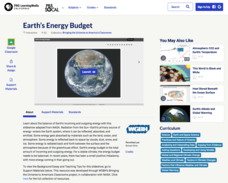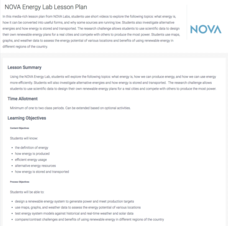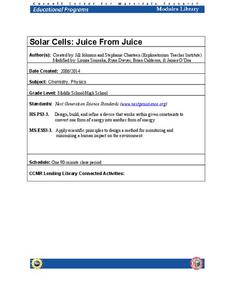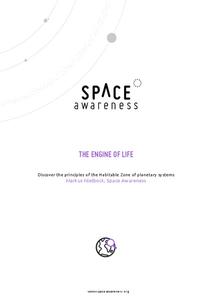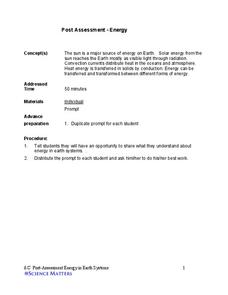Bonneville
Solar Energy Equity and Sustainability
Generate some knowledge about generating electricity. Pupils first read several articles to learn about solar energy, its advantages and disadvantages, and advancements in technology related to solar cells. They then have a class...
Bonneville
Variables Affecting Solar Power
Determine the best energy generator. Groups play with a photovoltaic cell to determine the variables that affect its energy output. The teams investigate a variable to determine the optimum performance of the solar cell. Pupils compare...
Museum of Science
Solar Cooker
A warm, sunny day is perfect for eating great food and learning about science at the same time. Future engineers build solar cookers to prepare food using the Sun's rays. They learn how energy converts from solar energy to thermal energy.
NOAA
The Climate Team: Make a Solar Heat Engine
Learners investigate how solar energy is converted into heat in part two of the 10-part Discover Your Changing World series. They build and test homemade solar cookers to boil water and cook rice. Pupils consider the impact of heat...
NOAA
The Great, Glowing Orb What You Will Do: Make a Solar Heat Engine
How is solar energy able to move wind and water to control the climate? Scholars explore the concept of solar energy in the first of 10 activities in the Discover Your Changing World series. They follow instructions to build homemade...
Pace University
Grades 9-10 Energy Sources
Alternative energy sources are becoming increasingly important. Learners have the opportunity to explore alternative energy sources using a differentiated instruction unit. They group together based on ability levels, assign roles to...
College Board
2006 AP® Environmental Science Free-Response Questions
There is a strong correlation between the carbon dioxide concentration in the air temperature. Scholars offer explanations for the correlation in one of four AP® free-response assessment questions. Their analyses in the other questions...
PBS
Real-World Ratio and Rate Reasoning: How to Power the Skate Park
Bring on the lights! Using an interactive, characters try to figure out how to light a skate park by examining area and ratios to determine the number of solar panels needed to power them. Pupils design a house with a roof to hold solar...
PBS
Insolation on Earth
In 2017, the world increased the capacity for using solar energy by a whopping 32 percent. Is solar energy the future for the planet? Approach this topic from the idea of how much solar energy reaches the surface of Earth. Individuals...
Magic of Physics
Solar Panel
Solar panels are everywhere! How do they work? Energize the class with an interactive that explains the magic of solar energy. The simple click-through demonstration shows how photons are captured and converted to a usable source of...
PBS
Earth’s Energy Budget
Is Earth's energy flow a little off balance? Explore our energy budget using a click-through interactive. Scholars discover the many factors that move solar energy around the planet and why the system is no longer in equilibrium.
Kenan Fellows
Ready, Set, Save on Solar Energy Technology!
Does your class have a bright future in the solar energy industry? Science scholars take an in-depth look at what's new in solar technology. After completing research into the solar industry, participants create and market a product in...
PBS
NOVA Energy Lab Lesson Plan
Can our energy resources keep up with our ever-growing population? Science scholars learn the basics of energy and Earth's energy resources during an electrifying lesson. The resource combines video clips and an engineering design...
Teach Engineering
Photosynthesis—Life's Primary Energy Source
Wouldn't it be great if you could produce your own food? Scholars learn about the processes of photosynthesis and cellular respiration in plants. They consider how to use photosynthesis as a model of an efficient system and how to apply...
DiscoverE
Sun-Warmed Treats
Treat your class to a fun activity, complete with treats. Groups create a solar oven from a pizza box. They then use it to heat up some food ... that's what an oven is for, after all!
DiscoverE
Solar-Heated Water
Heat up some interest in solar energy. Young engineers create a water heater that runs on solar power (simulated by a lamp). Using thermometers, they determine the change in temperature before and after the water goes through the heater.
DiscoverE
Design a Folding Solar Panel
Solar energy is an amazing alternative ... but, not always particularly portable! Challenge young scientists to a folding solar panel build-off with an easy-to-execute activity. Scholars brainstorm around specific design needs, construct...
Colorado State University
How Can I Turn a Solar Oven into a Refrigerator?
Whether you want to heat things up in science class or cool things down a bit, an intriguing lab's got you covered! Science scholars explore the principles of thermodynamics using a solar oven, then change the conditions to turn their...
Colorado State University
Why Are Compact Fluorescent Bulbs More Efficient?
Compact fluorescent bulbs are the easiest way to increase energy efficiency around the house. But why? Science scholars compare CF bulbs with their incandescent counterparts using a simple test. A solar-powered toy illuminates the...
Cornell University
Solar Cells: Juice From Juice
Unleash the power of ... blackberries! Science superstars create solar cells using the juice of berries or leaves of a citrus tree in an engaging lab. In addition to offering a plethora of resources, the teacher's guide gives background...
Space Awareness
The Engine of Life
There is a specific zone, or distance from a star, that a planet must be in order to have water in a liquid form. The activity demonstrates how flux density depends on its distance from the source. A photovoltaic cell gets power to drive...
Space Awareness
Climate Zones
The climate at the equator is hotter than the climate at the poles, but why? The lesson goes in depth, explaining how the angles of illumination relate to the heating rate at different latitudes and seasons. Scholars use a strong lamp,...
NOAA
Oceans of Energy
Are the earth's oceans really just giant batteries, waiting for their energy to be harnessed? Middle school mechanical engineers will be shocked by the amazing amount of energy that forms around them after diving into part four of a...
Science Matters
Post-Assessment Energy
After nine lessons and activities about energy, here is the final assessment. The 20-questions include multiple choice, multiple choice with justification, short answer, answer analysis, and labeling diagrams to challenge learners.












